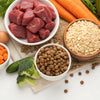What Can I Add to Dog Food for Weight Gain? A Comprehensive Guide for Pet Owners
- Houndsy
Table of Contents
- Introduction
- Understanding Weight Gain in Dogs
- Nutritional Components for Healthy Weight Gain
- What Can I Add to Dog Food for Weight Gain?
- Feeding Strategies for Weight Gain
- The Role of Exercise in Weight Gain
- Conclusion
- Frequently Asked Questions
Introduction
Did you know that nearly 40% of dogs in the United States are classified as overweight or obese? This startling statistic highlights a significant issue among our beloved pets, making it crucial for pet owners to understand not only how to maintain a healthy weight but also how to help their furry friends gain weight when needed. Whether your dog has recently lost weight due to stress, illness, or other factors, or simply needs a little boost to reach their ideal weight, this guide will explore various nutritious additions you can make to their diet to promote healthy weight gain.
In this blog post, we will delve into the reasons why a dog may struggle to gain weight, the nutritional components necessary for weight gain, and a variety of safe and effective food options to help your dog bulk up healthily. By the end of this article, you will have a comprehensive understanding of what you can add to your dog's food to promote weight gain and enhance their overall well-being.
We encourage you to reflect on your dog's current feeding routine and consider how you can adapt it to better support their health. Let's embark on this journey to ensure our canine companions thrive!
Understanding Weight Gain in Dogs
The Importance of a Healthy Weight
Maintaining a healthy weight is essential for your dog's overall health. Being underweight can lead to a host of issues, including weakened immune function, lower energy levels, and increased susceptibility to illness. Conversely, consistently underweight dogs may not receive adequate nutrition, which can hinder their growth and development, particularly in puppies and young dogs.
Identifying Underweight Dogs
Before we can help our dogs gain weight, it's important to know if they truly need to. Here are some signs that your dog may be underweight:
- Visible Ribs and Spine: If you can easily see your dog's ribs or spine without any fat covering, they may be underweight.
- Lethargy: A lack of energy or enthusiasm for play can indicate that your dog is not getting the nutrition they need.
- Poor Coat Condition: A dull, dry coat can be a sign of malnutrition.
- Behavior Changes: If your dog seems more anxious, irritable, or withdrawn, it could be a result of inadequate nutrition.
If you notice any of these signs, it's essential to consult your veterinarian to rule out any underlying health issues before making dietary changes.
Common Causes of Weight Loss and Difficulty Gaining Weight
There are several reasons why your dog might be struggling to gain weight:
- Health Issues: Conditions like diabetes, parasites, gastrointestinal disorders, or hyperthyroidism can lead to weight loss or difficulty gaining weight.
- Stress and Anxiety: Changes in the environment, such as a new pet, moving to a new home, or changes in routine, can affect your dog's appetite.
- Age: Older dogs may have slower metabolisms or dental issues that make eating difficult.
- Picky Eaters: Some dogs are simply more finicky, making it challenging to keep their weight up.
Understanding these factors can help guide your approach to weight gain effectively.
Nutritional Components for Healthy Weight Gain
Importance of Protein and Fat
To promote healthy weight gain, it's essential to include high-quality protein and healthy fats in your dog's diet.
- Protein: This macronutrient is vital for muscle development and overall health. Including protein-rich foods will help your dog build lean muscle mass rather than just gaining fat.
- Fat: Fats are calorie-dense, providing more energy than protein or carbohydrates. Including healthy fats in your dog's diet can help them gain weight more efficiently.
Caloric Density Matters
When selecting food for your dog, consider the caloric density. High-calorie foods will allow your dog to consume fewer calories while still meeting their weight gain needs. A good rule of thumb is to look for foods that have a high fat content, as they generally provide more calories.
What Can I Add to Dog Food for Weight Gain?
Now that we understand the nutritional requirements, let's explore specific foods and supplements that can help your dog gain weight effectively.
1. Peanut Butter
A favorite for many dogs, peanut butter is not only delicious but also packed with healthy fats and protein. Look for natural, unsweetened varieties without xylitol, which is toxic to dogs. You can mix a spoonful into their regular food or use it as a treat.
2. Cottage Cheese
Cottage cheese is an excellent source of protein and calcium. It's also low in lactose, making it easier for many dogs to digest. Serve it as a topping on their kibble or as a standalone snack.
3. Sweet Potatoes and Pumpkin
Both sweet potatoes and pumpkin are rich in fiber and can help with digestion while providing essential vitamins. They are low in calories but can be a nutritious addition to your dog's diet when served in moderation. You can mash them and mix them into your dog's food.
4. Eggs
Eggs are a fantastic source of protein and healthy fats. They are also easy to prepare—just scramble or boil them and mix them into your dog's food. Be sure to cook the eggs, as raw eggs can lead to biotin deficiency.
5. Coconut Oil
Coconut oil is rich in medium-chain triglycerides (MCTs), which provide quick energy and support weight gain. You can add a teaspoon of coconut oil to your dog's food, gradually increasing the amount as they adjust.
6. Fish Oil
Fish oil is an excellent source of omega-3 fatty acids, promoting a healthy coat and skin while supporting overall health. It can also improve appetite, which is beneficial for underweight dogs. Consult your veterinarian for the right dosage.
7. High-Quality Dog Food
While adding supplements and human foods can help, ensure that your dog's primary diet consists of high-quality dog food. Look for products that are specifically formulated for weight gain or growth, as they are designed to be calorie-dense and nutrient-rich.
Feeding Strategies for Weight Gain
Increase Meal Frequency
Feeding your dog smaller, more frequent meals can help them consume more calories throughout the day. Instead of two large meals, consider offering three to four smaller portions spaced throughout the day.
Mix in Wet Food
If your dog is picky, consider mixing wet food into their dry kibble. Wet food is often more palatable and can entice them to eat more. Look for high-calorie wet food options that complement their dry diet.
Monitor Portion Sizes
While it’s important to increase caloric intake, be mindful of portion sizes to avoid overfeeding. Gradually increase the amount of food you offer and monitor your dog’s response and weight.
Keep Track of Progress
Regularly weigh your dog and keep track of their body condition score (BCS) to monitor their progress. It’s important to make adjustments to their diet based on their weight gain or loss.
The Role of Exercise in Weight Gain
While it may seem counterintuitive, exercise plays a crucial role in helping dogs gain weight. Regular physical activity encourages muscle growth and helps maintain a healthy metabolism. Incorporate daily walks, playtime, and even agility training to help your dog build muscle while gaining weight.
Conclusion
Helping your dog gain weight can be a rewarding journey when approached thoughtfully. By understanding the nutritional needs of your dog and strategically adding healthy, calorie-dense foods to their diet, you can support their weight gain journey effectively. Always consult with your veterinarian before making significant changes to your dog's diet to ensure their health and safety.
As you embark on this journey of improving your dog's health, consider using the Houndsy Kibble Dispenser to streamline feeding. Our convenient design allows for perfect portion control, ensuring your dog gets the right amounts of food every time. Plus, it beautifully complements your home decor! You can explore more about our product here.
Frequently Asked Questions
1. How quickly can I expect my dog to gain weight?
Weight gain should be gradual and healthy. You should expect to see changes in your dog's weight within a few weeks of implementing dietary changes. Regular monitoring is essential.
2. Can I add all human food to my dog's diet?
Not all human foods are safe for dogs. Stick to safe options like peanut butter, sweet potatoes, and eggs, and avoid foods like chocolate, grapes, onions, and garlic.
3. Should I consult my vet before making dietary changes?
Yes, always consult your veterinarian before making significant changes to your dog's diet, especially if your dog is underweight or has health issues.
4. How can I tell if my dog is gaining weight healthily?
Monitor your dog's body condition score (BCS) and weight regularly. A healthy weight gain should be gradual and should not exceed 1-2% of their body weight per week.
5. What if my dog refuses to eat?
If your dog consistently refuses to eat, it's essential to consult your veterinarian to rule out any underlying health issues or stress factors that may be affecting their appetite.













